|
|
|
Sort Order |
|
|
|
Items / Page
|
|
|
|
|
|
|
| Srl | Item |
| 1 |
ID:
177877
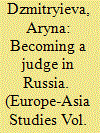

|
|
|
|
|
| Summary/Abstract |
Studies of the Russian legal system underscored the discrepancy between formal legal order and the informal practices used to maintain control over the judiciary. This essay argues that, despite laws introducing meritocratic principles of judicial selection at the beginning of the 1990s, the patronage of court presidents continues to significantly outweigh all other candidate characteristics, such as education and professional experience. By analysing 957 protocols issued by the judicial qualification boards (JQBs), I show that the influence of court presidents on the JQBs’ decision-making in the selection process undermines judicial independence and accountability.
|
|
|
|
|
|
|
|
|
|
|
|
|
|
|
|
| 2 |
ID:
177876
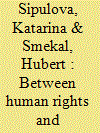

|
|
|
|
|
| Summary/Abstract |
The essay sheds light on the role of constitutional courts in transitional justice, focusing on their role in mitigating the conflicts between transitional justice and international human rights commitments. Through a study of the Czech Constitutional Court’s case law, we demonstrate that international human rights work both as a constraint and a tool. Constitutional courts use international human rights law selectively, when it suits their reasoning and views on transition. Nevertheless, the influence of international human rights law strengthens over time, especially when supported by the adverse rulings of international bodies, and gradually prevails over transitional justice justifications.
|
|
|
|
|
|
|
|
|
|
|
|
|
|
|
|
| 3 |
ID:
177896
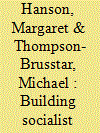

|
|
|
|
|
| Summary/Abstract |
Why do some attempts to use legal institutions to exert central state control fail, while others succeed? Through a controlled comparison of the Soviet Union (USSR) and the People’s Republic of China (PRC), we analyse the institutionalisation of the procuracy, an agency charged with enforcing central legal directives. We show that institutional design, competition, and political support during critical junctures created a positive feedback for the institutionalisation of the procuracy in the USSR but left it weak in China. These findings contribute to our understanding of institutional development, state-building, and authoritarian legal control.
|
|
|
|
|
|
|
|
|
|
|
|
|
|
|
|
| 4 |
ID:
177871
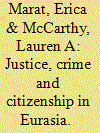

|
|
|
| 5 |
ID:
177898


|
|
|
|
|
| Summary/Abstract |
We study police inertia and the depth of public mistrust in, and apathy towards, zero tolerance policing (ZTP) in Kazakhstan. Using survey, social media and official data we show how ZTP failed: politicians did not summon any political will for the policy, the police subverted any attempted reforms, while citizens ignored them. The failure of ZTP delineates the limits of authoritarian modernisation. We argue that modernisers require assistance from citizens in reforming police yet cannot mobilise such assistance due to public distrust which itself is created by authoritarian modernisers’ preference for police loyalty over police good behaviour. The consequence is a decoupling of the rhetoric from the reality of police reform.
|
|
|
|
|
|
|
|
|
|
|
|
|
|
|
|
| 6 |
ID:
177875


|
|
|
|
|
| Summary/Abstract |
This essay analyses the implementation of China’s Regulations on Open Government Information (ROGI), an important piece of legislation that establishes Chinese citizens’ right to information. By international standards, the ROGI only offers relatively weak protection for this right, but Chinese citizens and civil society organisations have used the ROGI creatively to pursue a variety of goals from private rights protection to public interest advocacy. Strong civic activism has been a major driving force behind the gradual progress in public access to government information that has been achieved since the ROGI came into effect in 2008.
|
|
|
|
|
|
|
|
|
|
|
|
|
|
|
|
| 7 |
ID:
177873


|
|
|
|
|
| Summary/Abstract |
Using data from nationally representative surveys in 2015 in Georgia, Russia and Ukraine, we show that legal attitudes are shaped by experiences within a country’s specific political-legal order. Many who expressed support for legality when their own needs were at stake became more willing to evade the law when reminded of elites doing so. And, in an authoritarian, rule-by-law setting, expressed respect for legality correlates negatively with support for democracy. Whether a country’s most democracy-supporting citizens more strongly support legality will depend on whether the legal system is a fair and neutral arena or a tool of undemocratic political authorities.
|
|
|
|
|
|
|
|
|
|
|
|
|
|
|
|
| 8 |
ID:
177901


|
|
|
|
|
| Summary/Abstract |
Confronting a rising tide of police–society conflict, China’s Ministry of Public Security (MPS) is stepping up its propaganda campaigns. From television specials to social media accounts, this essay identifies the MPS’s public outreach efforts and tracks their prevalence and development. Using data from content analysis of policy documents and interviews with ministry officials, I argue that public relations campaigns have grown alongside the agency’s sometimes violent efforts to enforce law and order. Together with stability maintenance and the appearance of crime control, these tactics are part of a sophisticated and multipronged strategy to underpin regime legitimacy that extends far beyond brute force coercion.
|
|
|
|
|
|
|
|
|
|
|
|
|
|
|
|
| 9 |
ID:
177907


|
|
|
|
|
| Summary/Abstract |
This essay examines ‘smart city’ initiatives rapidly emerging across Eurasia that are aimed at the surveillance of disorderly and criminal behaviour in public spaces. They are a result of both locally driven demand to modernise law enforcement and global pressures to innovate. We specifically compare Kyiv, Almaty, and Bishkek. Each city differs in regard to who initiated smart city policies and under what conditions new technology was purchased from foreign vendors. Our essay contributes to the growing socio-legal literature on Eurasia by analysing how these electronic surveillance projects are used to manufacture an orderly, safe society and achieve modernity without the burden of deeper political change.
|
|
|
|
|
|
|
|
|
|
|
|
|
|
|
|
| 10 |
ID:
177874
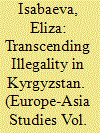

|
|
|
|
|
| Summary/Abstract |
Governments are reluctant to acknowledge illegal settlements. Ak Jar is an illegal settlement on the outskirts of Bishkek. If the settlement were formally legalised, its residents would receive property documents as well as recognition and inclusion. They have thus developed strategies to achieve the legalisation of Ak Jar. Although the settlement is technically illegal, by behaving ‘legally’ (that is, following legal norms and practices), the residents and community leaders generate the appearance and even some of the effects of legality (such as, legitimate power supply, recognition by politicians). This creates a halfway space between ‘legal’ and ‘illegal’ that moves the settlement away from ‘full’ illegality and closer to legalisation.
|
|
|
|
|
|
|
|
|
|
|
|
|
|
|
|
| 11 |
ID:
177905


|
|
|
|
|
| Summary/Abstract |
Moral entrepreneurs who volunteer to enforce rules by themselves have spread in 2010s Russia. As ‘rule enforcers’ they patrol the streets to catch offenders. Some of these enforcers have conflictual relations with the police, while others operate in cooperation with it. This essay describes the development of vigilante justice in contemporary Russia. Two particularities of the Russian case are striking. First, the activities of several citizen policing initiatives are in fact recorded and posted on YouTube and VKontakte, where they reach a large audience, generating support for their activities and, in particular, for the leaders of such groups. Second, the development of these groups is not the simple outcome of a powerless state failing to maintain order or to fight crime. The essay will reveal how these new forms of policing contribute, paradoxically, to the strengthening of state authority.
|
|
|
|
|
|
|
|
|
|
|
|
|
|
|
|
| 12 |
ID:
177872


|
|
|
|
|
| Summary/Abstract |
What factors affect citizens’ engagement with the state? We explore this question through a study of victims’ and bystanders’ willingness to report crimes to the police, using data from survey experiments conducted in Russia and Georgia. We find that citizens’ willingness to report in both countries is strongly influenced by the nature of the crime, but not generally by instruments that the state might use to encourage greater reporting. Our results recommend scepticism about the ability of governments to easily engineer citizens’ engagement with the state.
|
|
|
|
|
|
|
|
|
|
|
|
|
|
|
|
|
|
|
|
|